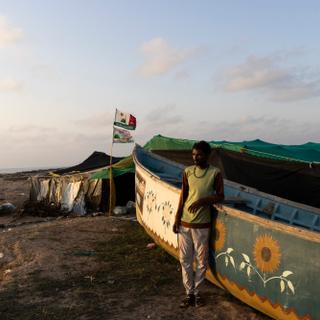


In northwest India, Muslim fishermen are being treated like pariahs
FeatureDespite having lived in India along the Arabian Sea for years, Muslim fishermen are now facing hostility from authorities and Hindu ultra-nationalists. Villages have been razed to the ground, fishing grounds closed and entire families thrown out onto the streets.
The landscape almost looks deserted, its towns with cow-dung-strewn streets uninviting and its atmosphere charged with a mix of devotion and tension. The Saurashtra peninsula in Gujarat, the westernmost part of India, feels like the end of the world. With its lack of airport and accessible only via potholed roads, this rhinoceros-head-shaped stretch of land seems to stick out from the country like an outgrowth. Hindus are undeterred by its remoteness: Every day, thousands of pilgrims flock north to Dwarka, one of Hinduism's seven holy cities, to visit the temple of the black god Krishna and south to see the temple of Somnath and pray to the blue god Shiva.
Halfway between these two major religious sites, Allarakha Ismailbhai Thimmar invited us to his home in Gosabara, a seemingly ordinary village. He set up a few plastic chairs in the shade of coconut palms planted along the Arabian Sea. Rows of fish were drying in the adjoining field. Then, Allarakha, sporting a short black beard and Western clothes and surrounded by his three brothers, started to tell his story. He explained how, in the spring of 2022, stunning news originated here before spreading across the country: Gosabara, the only entirely Muslim village in this state bordering Pakistan and where Hindus make up 90% of the population, was asking the courts for its 600 inhabitants to be collectively euthanized, be they men, women or children.
A few Indian journalists traveled to this remote corner, located more than an eight-hour drive from the regional economic capital of Ahmedabad, to probe the mood of those who had issued this strange plea, bound to fail since active euthanasia is illegal in India. Why would a fishing community that had been rooted in this land for over half a century ask for death? In their appeal, the plaintiffs pointed to the numerous discriminations, harassment by the authorities and administration and political persecution they faced because of their religion, and insisted on their "loyalty to the nation," claiming to have "given information to security agencies" on illegal activities allegedly "sponsored by Pakistan." Drug trafficking is fairly widespread in the region.
'We've lived here for seven generations'
This struggle was led by Allarakha, a 50-year-old father of six. And the news, according to him, is not good. The High Court of Gujarat has refused to hear their case, fining their lawyer a symbolic 10,000 rupees (€114) for wasting the court's time. This was yet another humiliation for the fishermen, who were hoping at least to be heard by the authorities. But the police bulldozed the village, partially destroying the cemetery and razing the dargah, the shrine of a revered ancestor. "They said these constructions were illegal, but we've lived here for seven generations. The dargah was authorized. We have the documents," corrected our host. In her despair, his daughter Asiya tried to end her life by slitting her wrists, as did four other villagers in late 2022 after several of them had been arrested.
You have 75% of this article left to read. The rest is for subscribers only.
